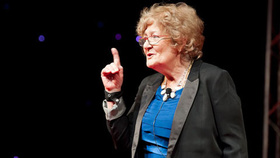I know what you're thinking.
我知道你們在想什么。
You think I've lost my way,
你們想我迷路了,
and somebody's going to come on the stage in a minute and guide me gently back to my seat.
有人馬上會上臺,把我領回到我的座位。
I get that all the time in Dubai. "Here on holiday are you, dear?"
在迪拜老是有人這樣問我?!坝H愛的,來度假???”
"Come to visit the children? How long are you staying?"
“來看孩子們嗎?呆多久???”
Well actually, I hope for a while longer yet.
事實上,我希望我還能多在這兒呆幾年呢。
I have been living and teaching in the Gulf for over 30 years.
我在海灣地區已經生活和教書有30多年了。
And in that time, I have seen a lot of changes.
在這期間,我目睹了很多變化。
Now that statistic is quite shocking.
那些統計數據是令人非常吃驚的。

And I want to talk to you today about language loss and the globalization of English.
而我今天要跟你們講的是關于語種的消失和英語的全球化。
I want to tell you about my friend who was teaching English to adults in Abu Dhabi.
我想告訴你們,我的一個朋友她在阿布扎比教成年人英語。
And one fine day, she decided to take them into the garden to teach them some nature vocabulary.
一天,她決定帶他們去花園,去教他們一些大自然用語。
But it was she who ended up learning all the Arabic words for the local plants,
但是結果她反而學了所有當地植被的阿拉伯名稱
as well as their uses -- medicinal uses, cosmetics, cooking, herbal.
和它們的用途--藥用的、化妝用的、食用的,草藥。
How did those students get all that knowledge?
那些學生是怎樣得到這些知識的呢?
Of course, from their grandparents and even their great-grandparents.
當然是從他們的祖父母那里,甚至是他們的曾祖父母那里。
It's not necessary to tell you how important it is to be able to communicate across generations.
本來我沒有必要告訴你們能夠跨代交流是多么重要。
But sadly, today, anguages are dying at an unprecedented rate.
但是,令人惋惜的是,今天很多語種正在以空前的速度消失著。
A language dies every 14 days.
每14天就有一種語言消失。











